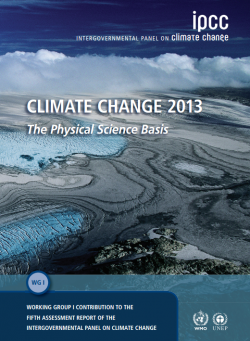September 29, 2013
Speculation versus Science: The Findings of the IPCC’s Fifth Assessment Report
On September 27, 2013, the first part of IPCC’s Fifth Assessment Report was published. Leading up to its release, speculation and rumours were in full swing. Some of that speculation focused on the projections of rises in air temperature now and into the future. Climate skeptics seized on this stating that “the scientific belief that emitting carbon dioxide into the atmosphere increases the temperature of the planet, is wrong” (McGrath, 2013). Professor David Karoly from the University of Melbourne, who was involved in the actual process of developing the report for the IPCC, took a more measured approach stating that while the rate of air temperature has slowed down, there are other numbers that have gone up (for example, there has been continued warming in deep oceans, ocean heat content has increased, and glaciers have continued to melt). Most significantly, “Arctic Sea ice has been decreasing at a faster rate over the last 15 years than over the previous 30 years” (Cooper, 2013). As a result, while the rate at which air temperature is rising may have been lowered by the IPCC, it doesn’t necessarily mean the planet’s temperature as a whole isn’t going up.
 There was also an opinion piece published in The Washington Examiner with the bold headline “Global warming report could backfire on environmentalists.” It predicted that the IPCC report could leave climate change deniers “more confident and assertive” as “the computer forecasts used [by the IPCC] to produce those forecasts, it turns out, were wrong” (York, 2013). The circulation of misinformation like this has been a central issue leading up to the release of the report. As Alexander White in The Guardian has pointed out, there have been mainstream news outlets in Australia for example that “focus on manufactured scandals and climate change denialism” (White, 2013). Misinformation has the potential to spread like wildfire when influential news outlets and newspapers publish speculative information not actually grounded in the reality of the science reported in the IPCC. Some of the misinformation which was published stated that the IPCC report “expected to admit that scientific predictions for global warming and the effects of carbon emissions have proved to be inaccurate” (Waterfield, 2013). This in-fact was not the case. Europe’s Climate Commissioner, Connie Hedegaard responded to such assertions by stating that a growth in the population worldwide justifies the current policies because of the pressure it will put on energy supplies, regardless of the rate at which global warming is occurring. Or, as Marcia Yerman from the Huffington Post reports, the conclusions of the report show that “there is no doubt about the reality of climate change; it is caused by human action” (Yerman, 2013). The take away is that the IPCC finds human activity central to the planet’s present rate of climate change.
There was also an opinion piece published in The Washington Examiner with the bold headline “Global warming report could backfire on environmentalists.” It predicted that the IPCC report could leave climate change deniers “more confident and assertive” as “the computer forecasts used [by the IPCC] to produce those forecasts, it turns out, were wrong” (York, 2013). The circulation of misinformation like this has been a central issue leading up to the release of the report. As Alexander White in The Guardian has pointed out, there have been mainstream news outlets in Australia for example that “focus on manufactured scandals and climate change denialism” (White, 2013). Misinformation has the potential to spread like wildfire when influential news outlets and newspapers publish speculative information not actually grounded in the reality of the science reported in the IPCC. Some of the misinformation which was published stated that the IPCC report “expected to admit that scientific predictions for global warming and the effects of carbon emissions have proved to be inaccurate” (Waterfield, 2013). This in-fact was not the case. Europe’s Climate Commissioner, Connie Hedegaard responded to such assertions by stating that a growth in the population worldwide justifies the current policies because of the pressure it will put on energy supplies, regardless of the rate at which global warming is occurring. Or, as Marcia Yerman from the Huffington Post reports, the conclusions of the report show that “there is no doubt about the reality of climate change; it is caused by human action” (Yerman, 2013). The take away is that the IPCC finds human activity central to the planet’s present rate of climate change.
Having read through the speculative reports associated with the release of the IPCC report, I was eager to read the actual report itself. Compared to the speculation I encountered in advance of the IPCC report’s actual release, I found the following statements to provide a sobering reminder of the challenges we face:
- Human influence has been detected in warming of the atmosphere and the ocean, in changes in the global water cycle, in reductions in snow and ice, in global mean sea level rise, and in changes in some climate extremes. This evidence for human influence has grown since AR4. It is extremely likely that human influence has been the dominant cause of the observed warming since the mid-20th century.
- Continued emissions of greenhouse gases will cause further warming and changes in all components of the climate system.
- The global ocean will continue to warm during the 21st century. Heat will penetrate from the surface to the deep ocean and affect ocean circulation.
- It is very likely that the Arctic sea ice cover will continue to shrink and thin and that Northern Hemisphere spring snow cover will decrease during the 21st century as global mean surface temperature rises. Global glacier volume will further decrease.
- Global mean sea level will continue to rise during the 21st century (see Figure SPM.9). Under all RCP scenarios the rate of sea level rise will very likely exceed that observed during 1971-2010 due to increased ocean warming and increased loss of mass from glaciers and ice sheets. (Intergovernmental Panel on Climate Change (IPCC), 2013)
The list goes on. According to Michael Mann, the misinformation focused on the degree of threat and the strength of the evidence being presented by the IPCC this time around (Mann, 2013). Ultimately, this most recent update from the IPCC represents an important contribution to the public understanding of anthropogenic climate change. Science is at its core an ongoing process and while challenges exist in understanding a system as complex planetary climate, the reports published by the IPCC are comprehensive and serve as an important source of information (Cooper, 2013; McGrath, 2013).
Works Cited
Cooper, H. (2013). IPCC faces criticism ahead of report’s release. Austrailian Broadcasting Corporation. Retrieved from http://www.abc.net.au/7.30/content/2013/s3857357.htm
Intergovernmental Panel on Climate Change (IPCC). (2013). Working Group I Contribution to the IPCC Fifth Assessment Report. Climate Change 2013: The Physical Science Basis. Summary for Policymakers. Retrieved from http://www.climatechange2013.org/images/uploads/WGIAR5-SPM_Approved27Sep2013.pdf
Mann, M. E. (2013, September 27). The IPCC, Climate Change and Bad Faith Attacks on Science. The Huffington Post. Retrieved from http://www.huffingtonpost.com/michael-e-mann/climate-change-report_b_3999277.html
McGrath, M. (2013, September 23). Global warming pause “central” to IPCC climate report. BBC News. Retrieved from http://www.bbc.co.uk/news/science-environment-24173504
Waterfield, B. (2013, September 16). EU policy on climate change is right even if science was wrong, says commissioner. The Telegraph. Brussels. Retrieved from http://www.telegraph.co.uk/earth/environment/climatechange/10313261/EU-policy-on-climate-change-is-right-even-if-science-was-wrong-says-commissioner.html?utm_content=buffer4cc13&utm_source=buffer&utm_medium=twitter&utm_campaign=Buffer
White, A. (2013, September 26). Denial abounds in Australia as IPCC report lands. The Guardian. Retrieved from http://www.theguardian.com/environment/southern-crossroads/2013/sep/26/climate-change-denial-ipcc-report-australia
Yerman, M. G. (2013, October 23). IPCC Report: Man-made Climate Change Is a Scientific Certainty. Huffington Post. Retrieved from http://www.huffingtonpost.com/marcia-g-yerman/ipcc-report-manmade-climate_b_4031507.html
York, B. (2013, September 16). Global warming report could backfire on environmentalists. Washington Examiner. Retrieved from http://washingtonexaminer.com/global-warming-report-could-backfire-on-environmentalists/article/2535889
 Simran Chattha completed her B.E.S. degree at York University. More recently, she graduated from the University of Guelph with an M.A. in Political Science specializing in Public Policy and Administration. Her research interests lie in the areas of environmental policy and climate change adaptation.
Simran Chattha completed her B.E.S. degree at York University. More recently, she graduated from the University of Guelph with an M.A. in Political Science specializing in Public Policy and Administration. Her research interests lie in the areas of environmental policy and climate change adaptation.




Comments are closed here.